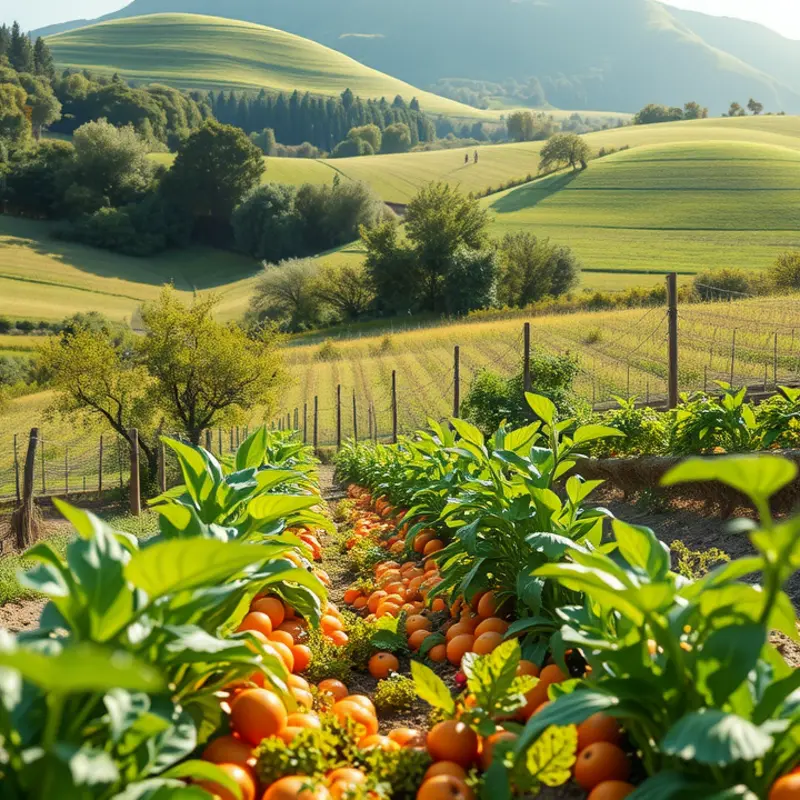Exploring the profound connection between our food choices and air quality can empower consumers to create meaningful change. By opting for sustainable, plant-based, and locally sourced foods, we can significantly reduce pollution and greenhouse gas emissions. This article delves into practical food options and lifestyle changes tailored for environmentally-conscious individuals striving to make a positive impact on air quality through their dietary habits.
Plant-Based Diets: Breathing Easy

Transitioning to a plant-based diet holds significant potential for improving air quality. The reduction in carbon emissions is a primary benefit. Livestock farming is a major contributor to greenhouse gases, including carbon dioxide (CO2), methane, and nitrous oxide. These emissions occur throughout the entire lifecycle of livestock—from growing feed crops, digestive processes, to manure management. In contrast, the cultivation of fruits, vegetables, grains, and legumes produces far fewer emissions.
The global impact of livestock on air quality is profound. According to environmental studies, the livestock sector accounts for approximately 14.5% of all human-induced greenhouse gas emissions. In fact, methane from enteric fermentation, mainly from ruminants like cows, is a crucial component of these emissions. A plant-based diet circumvents these emissions by reducing the demand for meat and dairy products, thereby reducing the pressure on agricultural systems that prioritize livestock.
Choosing plant-based foods can result in lower nitrogen runoff and ammonia emissions, which contribute to air pollution. Growing vegetables and grains requires fewer resources, such as fertilizers and water, compared to animal agriculture. This not only lessens the environmental load but also supports soil health and promotes biodiversity. As soil quality improves, it more effectively sequesters carbon, creating another loop of positive environmental feedback.
The benefits extend beyond air quality. A diet rich in plants supports a more sustainable food supply. Fruits, vegetables, legumes, and grains require less land and energy. Producing plant foods is generally more efficient, allowing for methods that can enhance food security and sustainability. These foods can usually travel less distance from farm to table, reducing transportation-related emissions.
Adopting a plant-based lifestyle also offers personal health benefits. Diets rich in fruits and vegetables can reduce the risk of chronic diseases. This shift could subsequently ease the environmental burden of healthcare services, which adds to emissions. Additionally, more plant-rich diets typically mean fewer processed foods, leading to reduced industrial food production emissions.
Highlighting mindful choices prepares individuals for a broader adoption of sustainable practices. If you’re interested in incorporating these choices into your lifestyle, you might explore further resources like mindful food decision-making, which can help identify and implement changes effectively.
Ultimately, plant-based diets offer a pathway to breathing cleaner air. They encourage agricultural systems that align with ecological goals and address the urgent need for climate remediation. Through more deliberate consumption choices, individuals contribute to air quality improvements and the overall health of the planet.
Supporting Local: The Power of Seasonal Choices

Choosing to eat locally and seasonally can significantly reduce the carbon footprint of our meals. When we opt for fruits and vegetables grown nearby, we minimize the emissions from long-distance transportation. This shift not only benefits the environment but also promotes fresher and tastier produce on our plates.
Local farms often use more sustainable practices than massive agribusinesses. When you support local farmers, you’re encouraging agricultural practices that respect the environment, such as crop rotation and reduced chemical use. Furthermore, buying locally can mean less packaging waste, another win for sustainability.
Community-supported agriculture (CSA) is a brilliant way to align our food choices with eco-friendly practices. In a CSA model, individuals or families purchase shares in a local farm’s harvest. It fosters a direct connection between consumers and farmers, giving farmers a stable income and consumers access to fresh, seasonal produce.
By choosing to invest in a CSA, you’re likely to consume more seasonal foods. Seasonal eating means enjoying foods at their peak flavor and nutritional value, reducing the need for imported items. For instance, savoring crisp, sweet apples in the fall or juicy tomatoes in the summer can elevate our meals and ensure we’re eating within nature’s rhythm.
Alongside the environmental benefits, supporting local agriculture fosters community resilience. It ensures local food security by keeping small farms in operation. In turn, this helps maintain a diverse and resilient local food system. Moreover, local farms contribute to regional economies by creating jobs and circulating money within the community.
To further empower your food choices, consider mindful meal planning that prioritizes local and seasonal ingredients. Efficient grocery cycles can help manage consumption patterns and reduce waste.
Eating locally and seasonally is a simple yet powerful act. It promotes cleaner air, supports biodiversity, and conserves resources. By understanding the impact of our food choices and making informed decisions, we not only nourish ourselves but also contribute to a healthier planet.
Final words
The choices we make at the grocery store and on our plates profoundly impact not only our health but also the health of our planet. By embracing a plant-based diet and prioritizing locally sourced, seasonal foods, environmentally-conscious individuals can create ripples of change that lead to cleaner air and a more sustainable future. Every meal is an opportunity to make a difference—one bite at a time. Let’s commit to eating wisely, supporting local farmers, and protecting the air we breathe for generations to come.








